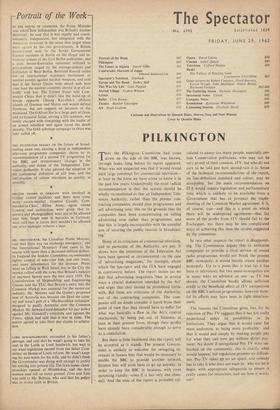PILKINGTON
rr HAT the Pilkington Committee had come I down on the side of the BBC was known, through leaks, long before its report appeared. What was not suspected was that it would reveal such large contempt for commercial television— at least in the form we have come to know it in the past few years. Undoubtedly the most radical recommendation is that the system should be wholly reconstituted so that an Independent Tele- vision Authority, rather than the present con- tracting companies, should plan programmes and sell advertising time; this on the grounds that the companies have been concentrating on selling advertising time rather than programmes, and that this 'is largely incompatible with the essential aim of securing the public interest in broadcast- ing.'
Many of its criticisms of commercial television, and in particular of the Authority, are just. It shows how the intentions of the Television Act have been ignored or circumvented—in the case of 'advertising magazines,' for example, about which the Spectator and the ITA have engaged in controversy before. The report insists (as we did) that advertising magazines 'blur in several ways a crucial distinction intended by the Act' and urges that they should be prohibited forth- with. But these are criticisms of the Authority, not of the contracting companies. The com- panies will no doubt consider it harsh from their point of view that they should have to suffer for what was basically a flaw in the Act's control mechanism, by being put out of business, at least in their present form, though their profits have already been considerable enough to serve as a consolation.
But there is little likelihood that the report will be accepted as it stands. The present Govern- ment is unlikely to welcome the swingeing in- creases in licence fees that would be necessary to enable the BBC to provide another network (licence fees will soon have to go up anyway, in order to keep the BBC in business, with costs mounting rapidly—even if it has'only one chan- nel). And the tone of the report is probably cal- culated to annoy too many people, especially cer- tain Conservative politicians, who may not be very proud of their creation, ITV, but who do not care to be told just how second-rate it is. Some of the technical recommendations of the report, on line-definition standard and colour, may be acceptable; but the main recommendation on ITA would require legislation and parliamentary time which is unlikely to be available from a Government that has in prospect the imple- menting of the Common Market agreement. It is, of course, true—and this is a point on which there will be widespread agreement—that far more of the profits from ITV should fall to the Exchequer, but there may be less complicated ways of achieving this than the system, suggested by the committee.
In two other respects the report is disappoint- ing. The Commission argues that to authorise companies to provide a rival service of sound radio programmes would not break the present BBC monopoly; it would merely create another monopoly. Up to a point this is true (as it has been in television); but two quasi-monopolies are in many ways an advance on one—as TV has shown; the Committee hardly allows sufficient credit to the beneficial effect of ITV competition on the BBC's serious programmes, however bane• ful its effects may have been in light entertain- ment.
The reasons the Committee gives, too, for its rejection of Pay TV suggests that it has not really understood either its possibilities or its limitations. They argue that it would cater for mass audiences, as• being more profitable: and that it would end simply by making people pay for what they can now get without direct pay- ment. No doubt if unregulated Pay TV were un- leashed on the community, this is exactly what would happen; but regulation presents no difficul- ties. Pay TV takes up no air space, and nobody has to take it who does not want to: why not let it begin, with appropriate safeguards to ensure it really caters for'minorities, and see how it works out?
































 Previous page
Previous page